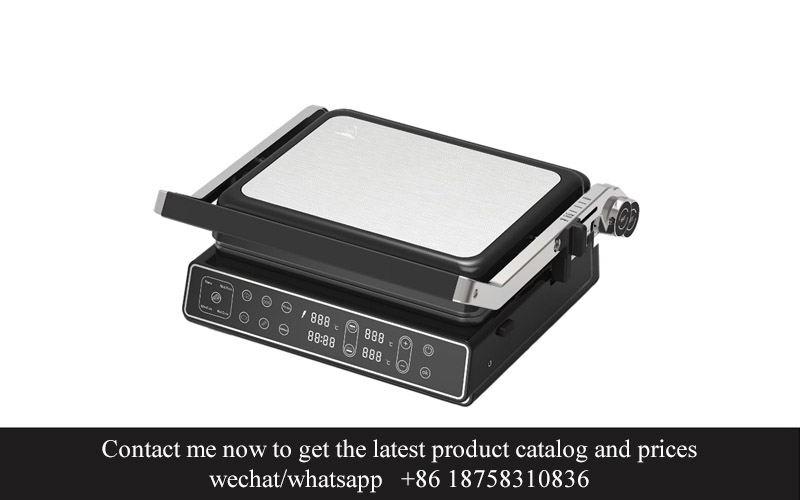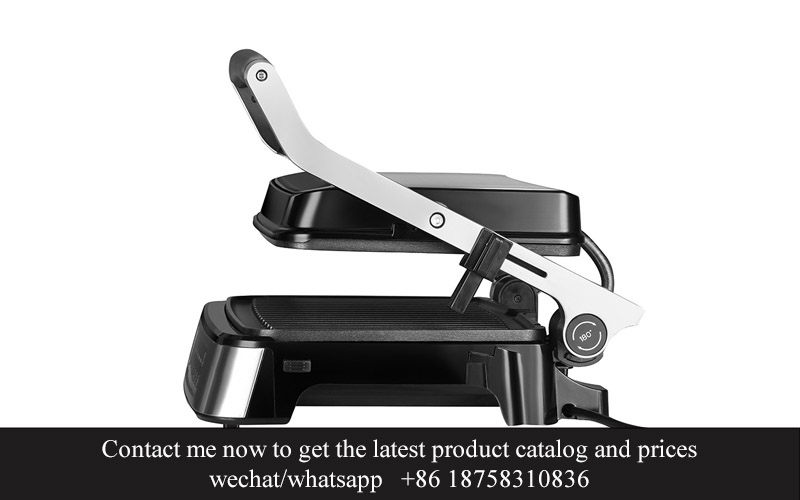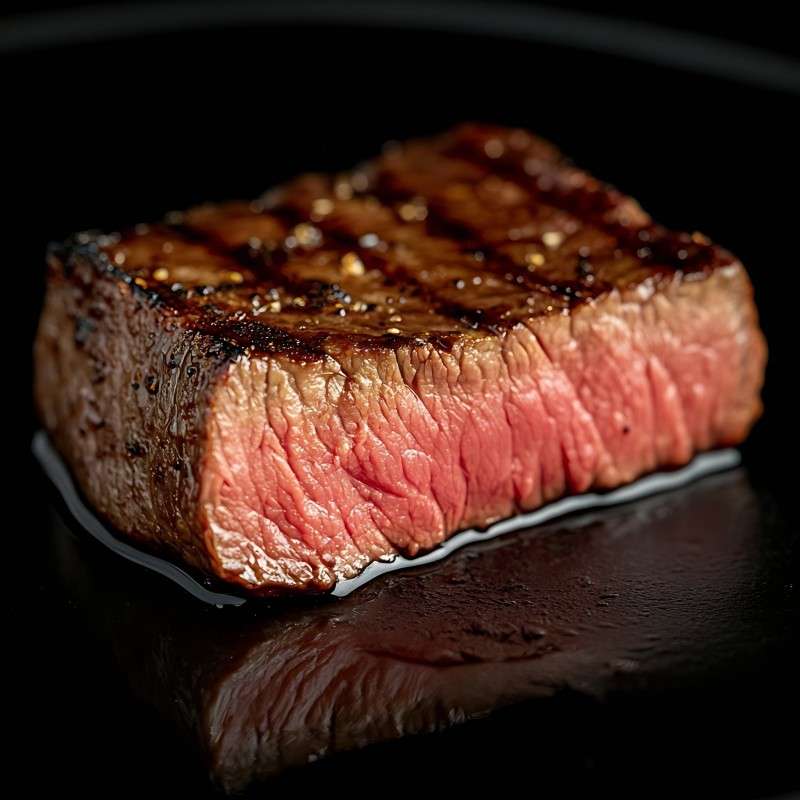Address
304 North Cardinal
St. Dorchester Center, MA 02124
Work Hours
Monday to Friday: 7AM - 7PM
Weekend: 10AM - 5PM
Address
304 North Cardinal
St. Dorchester Center, MA 02124
Work Hours
Monday to Friday: 7AM - 7PM
Weekend: 10AM - 5PM

Navigating the world of grill manufacturers can be a complex task, especially when ensuring that the factory you choose can deliver not just high-quality products, but also reliable service and support. In this article, we delve into the intricacies of finding the perfect grill manufacturer factory that aligns with your specific needs, understanding the common pitfalls that can lead to factory failures, and the critical role of quality control in preventing such issues. Whether you’re a business owner or a procurement specialist, knowing how to effectively communicate and engage with a factory is key to maintaining a robust and successful business relationship.
Quality in grill manufacturing is not just a buzzword; it’s the cornerstone of a successful business. The importance of maintaining high standards cannot be overstated, as it directly impacts customer satisfaction, brand reputation, and the overall success of your grill business. Let’s delve into why quality is paramount in this industry.
When it comes to grills, customers are looking for durability, efficiency, and ease of use. A poorly manufactured grill can lead to frustration, safety concerns, and a quick return to the store. On the other hand, a well-crafted grill can become a cherished piece of outdoor equipment that enhances the grilling experience.
Firstly, the materials used in grill manufacturing are crucial. High-quality steel, stainless steel, and other durable metals are essential for building a grill that can withstand the rigors of outdoor use. Inferior materials can lead to rust, warping, and a shorter lifespan, which is not only a disappointment to the customer but also a financial loss for your business.
Secondly, the design and engineering of a grill play a significant role in its quality. A well-thought-out design ensures that the grill is not only visually appealing but also functional. Features like even heat distribution, sturdy construction, and user-friendly controls are all indicators of a high-quality grill. A manufacturer that invests in R&D to improve these aspects is likely to produce a product that stands out in the market.
Thirdly, the manufacturing process itself is critical. The precision of welding, the quality of the paint finish, and the attention to detail in assembly all contribute to the final product’s quality. A factory that skimps on these steps may produce a grill that looks good on the outside but falls apart after a few uses.
Moreover, the longevity of a grill is directly tied to the quality of its components. High-quality burners, hinges, and ignition systems are less likely to fail and provide a better grilling experience. A grill that breaks down frequently due to poor component quality will not only frustrate customers but also tarnish the reputation of the brand.
Customer feedback is another key indicator of quality. A manufacturer that actively seeks and listens to customer opinions is more likely to address any issues promptly and make improvements. This feedback loop is crucial for ensuring that the grills produced are meeting the needs and expectations of the consumers.
Additionally, quality extends beyond the product itself. It includes the service and support provided by the manufacturer. A reliable grill manufacturer should offer clear instructions, a comprehensive warranty, and accessible customer service. This level of commitment to customer satisfaction reinforces the perception of quality.
In the competitive grill market, standing out is not just about having a unique design or a lower price point. It’s about offering a product that is built to last, that performs as advertised, and that provides a positive experience for the user. A grill that is of poor quality can quickly become a liability, while one that is well-made can become a staple in a customer’s outdoor kitchen.
Furthermore, the impact of quality on a brand’s reputation cannot be ignored. A manufacturer with a reputation for producing high-quality grills is more likely to attract new customers through word-of-mouth and positive reviews. Conversely, a brand known for poor quality products will struggle to gain trust and retain customers.
In conclusion, the importance of quality in grill manufacturing cannot be overstated. It is the foundation upon which customer satisfaction, brand loyalty, and business success are built. By focusing on materials, design, manufacturing processes, components, customer feedback, and service, a grill manufacturer can ensure that their products meet the highest standards and deliver a superior grilling experience.

In the bustling world of grill production, factory failures can occur due to a myriad of factors, each playing a critical role in the quality and reliability of the end product. Understanding these common causes is essential for both manufacturers and consumers alike. Here’s a closer look at some of the most prevalent issues that can lead to factory failures in grill production:
Poor Material Selection: The foundation of any grill lies in the materials used. Using substandard or inappropriate materials can lead to durability issues, such as rust, warping, or poor heat distribution. For instance, opting for low-grade stainless steel instead of high-quality 304 or 316 stainless steel can compromise the integrity of the grill.
Inadequate Design and Engineering: The design of a grill is crucial for its performance and longevity. A failure to consider factors like heat resistance, structural integrity, and user convenience can result in products that don’t meet customer expectations. Overlooking these aspects can lead to grill components failing under normal use.
Faulty Assembly Processes: The assembly of grill components is a critical step in the production process. Inaccurate fits, loose connections, or incorrect part orientation can all contribute to a grill that doesn’t perform as intended. These issues often arise from lack of training, outdated machinery, or insufficient quality checks.
Insufficient Quality Control: A robust quality control system is non-negotiable in grill manufacturing. Skipping or rushing through quality checks can lead to defects in the final product. For example, failing to inspect welds for cracks or not verifying the accuracy of temperature controls can result in a grill that fails to maintain consistent cooking temperatures.
Inadequate Testing Protocols: Grill manufacturers must subject their products to rigorous testing to ensure they meet safety and performance standards. Without thorough testing, such as drop tests, heat resistance tests, and user simulations, a grill may fail under the stress of everyday use.
Environmental Factors: The manufacturing environment can significantly impact the quality of grills. Extreme temperatures, humidity, and dust can all affect the materials and components, leading to premature failure. Factories that do not control these environmental factors adequately risk producing defective products.
Supply Chain Disruptions: A grill manufacturer’s supply chain can be a weak link. Delays in receiving raw materials, component shortages, or quality issues with suppliers can all lead to production delays and ultimately, factory failures. This is especially true in the grill industry, where timing is crucial for maintaining product consistency.
Lack of Worker Training: Skilled labor is the backbone of any manufacturing process. Without proper training, workers may not understand the importance of their roles in the production line, leading to errors and subpar craftsmanship. Regular training and retraining sessions are essential to maintain high-quality standards.
Neglecting Maintenance and Upkeep: Regular maintenance of manufacturing equipment is vital to prevent breakdowns and ensure consistent production. Neglecting maintenance can lead to equipment failure, which in turn affects the entire production process and the quality of the final product.
Overlooking Customer Feedback: Customer feedback is a valuable tool for identifying potential issues with grills. Failing to listen to and act on customer complaints can result in recurring problems that could have been easily addressed.
By recognizing these common causes of factory failures in grill production, manufacturers can take proactive steps to prevent them. This includes investing in high-quality materials, ensuring rigorous quality control measures, maintaining a stable supply chain, and fostering a culture of continuous improvement. For consumers, being aware of these issues can help in making informed decisions when selecting a grill and in understanding the importance of purchasing from a reputable manufacturer.

Navigating the grill manufacturing landscape can be daunting, especially when it comes to selecting a reliable partner. Here are several key indicators that can help you identify a trustworthy grill manufacturer:
Longevity in the Industry: A manufacturer with a proven track record and years of experience is more likely to understand the nuances of grill production. Look for companies that have been in business for a decade or more, as they’ve likely encountered and resolved various challenges over time.
Certifications and Compliance: Reliable grill manufacturers often hold certifications that demonstrate their adherence to quality standards and safety regulations. Look for certifications like ISO 9001, ISO 14001, and CE marking, which ensure that the products meet international quality and environmental standards.
Customer Reviews and Testimonials: Reading through customer feedback can provide invaluable insights into the quality of a manufacturer’s products and services. Check out online reviews, social media platforms, and industry forums to gauge the satisfaction of past clients.
Product Range and Customization: A versatile manufacturer should be able to offer a wide range of grill models and customization options. This indicates their ability to cater to diverse market needs and suggests a commitment to innovation and customer satisfaction.
Quality Control Measures: A reliable grill manufacturer will have stringent quality control processes in place. This includes regular inspections, testing, and audits throughout the production cycle. Ask about their quality control protocols and request to see documentation of their testing procedures.
After-Sales Service: The level of after-sales service a manufacturer provides is a good indicator of their reliability. Ensure they offer support for their products, including installation, maintenance, and repair services. A manufacturer that stands behind their products is more likely to be trustworthy.
Communication and Transparency: A manufacturer that communicates effectively and maintains transparency is more likely to be reliable. They should be able to provide clear information about their products, pricing, lead times, and delivery schedules. Regular updates and responsive customer service are also crucial.
Financial Stability: Investigate the financial health of the manufacturer. A stable and financially sound company is more likely to be reliable in terms of meeting orders, maintaining quality, and staying in business long-term.
Supply Chain Reliability: A manufacturer’s ability to consistently source high-quality materials and components is vital. Ask about their supply chain and how they ensure the reliability of their suppliers. A robust supply chain is a sign of a reliable manufacturer.
Innovation and R&D: A manufacturer that invests in research and development is likely to be more innovative and responsive to market trends. This indicates a commitment to staying ahead of the competition and delivering cutting-edge products.
Warranty and Return Policies: A reliable grill manufacturer will offer a comprehensive warranty and clear return policies. This shows their confidence in the quality of their products and their willingness to stand by their customers.
Industry Reputation: Finally, consider the overall reputation of the manufacturer within the industry. Are they known for producing high-quality grills? Have they received awards or recognition for their products or services? A strong industry reputation is a good indicator of reliability.
By carefully considering these factors, you can identify a reliable grill manufacturer that aligns with your business needs and ensures the success of your product offerings.

In the world of grill manufacturing, the role of quality control cannot be overstated. It’s the backbone that ensures every product leaving the factory meets the highest standards. Here’s a closer look at how quality control functions to prevent failures:
Setting the Standards: Quality control begins with establishing clear, stringent standards for the manufacturing process. This includes specifications for materials, design, construction, and performance. These standards serve as a roadmap for every step of production, ensuring that every grill is crafted to the same high level of excellence.
Material Selection: The choice of materials is crucial. Inferior materials can lead to durability issues, rust, and poor performance. A reliable grill manufacturer rigorously tests and selects materials that are not only of high quality but also suitable for the intended use. This includes metals, plastics, and coatings that can withstand outdoor elements and frequent use.
Consistent Manufacturing Processes: Consistency is key in grill production. Quality control involves monitoring and maintaining consistent manufacturing processes. This means ensuring that every grill goes through the same sequence of steps, from cutting and welding to painting and assembly. Variations in these processes can lead to defects and failures.
Regular Inspections: Regular inspections at various stages of production are essential. Workers and quality control personnel should inspect grills for any signs of defects, such as cracks, uneven welds, or misaligned parts. These checks help catch issues early, preventing them from becoming more significant problems later on.
Testing for Performance: Quality control doesn’t just stop at visual inspections. It also involves rigorous testing to ensure that grills meet performance standards. This can include heat resistance tests, durability tests, and safety checks. For example, a grill should be able to maintain a consistent temperature and not overheat, which could lead to burns or fires.
Employee Training: Employees play a vital role in quality control. A reliable grill manufacturer invests in training programs to ensure that workers understand the importance of their roles in maintaining high standards. This includes how to use equipment properly, how to identify potential issues, and how to report them.
Continuous Improvement: Quality control is not a one-time event but an ongoing process. Manufacturers should always be looking for ways to improve their products and processes. This could involve adopting new technologies, refining existing methods, or seeking feedback from customers to identify areas for enhancement.
Supplier Management: The quality of the final product also depends on the suppliers of raw materials and components. A reliable grill manufacturer carefully selects suppliers and maintains strong relationships with them. Regular audits and performance reviews help ensure that suppliers meet the same high standards as the manufacturer.
Documentation and Record Keeping: Proper documentation is crucial for quality control. Every aspect of the manufacturing process should be well-documented, from the initial design to the final inspection. This not only helps in identifying and resolving issues but also provides a record for future reference and compliance with regulations.
Customer Feedback: Finally, customer feedback is invaluable for quality control. A reliable grill manufacturer actively seeks out and listens to customer feedback to understand how their products are performing in real-world conditions. This information can be used to make improvements and prevent future failures.
By focusing on these aspects of quality control, grill manufacturers can significantly reduce the risk of failures, ensuring that their customers receive products that are not only durable and reliable but also meet their expectations and safety standards.

In the world of manufacturing, the reliability of a factory is paramount, especially when it comes to producing grills. Factory failures can have a profound impact on your business, from financial losses to reputational damage. Here’s a closer look at how these failures can affect your operations:
The financial strain of factory failures can be immense. When a production line halts due to equipment breakdowns or quality issues, the costs can quickly add up. Not only do you lose out on potential sales, but you also incur additional expenses to rectify the problems. Repairing or replacing faulty machinery, hiring temporary workers to maintain production, and facing raw material shortages can all lead to significant financial setbacks.
Customer dissatisfaction is a direct consequence of factory failures. If your customers receive products that are subpar or faulty, it can erode their trust in your brand. This can lead to a loss of repeat business and negative word-of-mouth, which can be hard to recover from. The long-term impact on customer loyalty and brand image can be detrimental, especially in a competitive market where customer service and product quality are key differentiators.
Supply chain disruptions are another critical aspect affected by factory failures. When one link in the supply chain breaks down, it can create a ripple effect throughout the entire system. This can lead to delays in delivery, increased lead times, and the inability to meet customer orders. For businesses that rely on a just-in-time inventory system, these disruptions can be particularly damaging, as they can disrupt the flow of goods and lead to stockouts.
The cost of rework and warranty claims can also skyrocket following factory failures. Products that fail to meet quality standards often require rework or replacement, which not only adds to the production costs but also consumes valuable time and resources. Moreover, the need to honor warranties due to defective products can lead to substantial financial liabilities. This can strain your company’s finances and, in some cases, force you to reevaluate your warranty policies.
Factory failures can also lead to legal and regulatory repercussions. If a product is found to be unsafe or non-compliant with industry standards, your business may face fines, lawsuits, or even the loss of certification. This not only affects your bottom line but can also tarnish your company’s reputation in the eyes of regulators and consumers alike.
In the realm of brand reputation, factory failures can be a significant blow. A history of manufacturing issues can lead to negative perceptions of your brand, making it harder to attract new customers and retain existing ones. This reputational damage can take years to rebuild, especially if the failures are widespread and publicized.
Moreover, the morale of your employees can be adversely affected by factory failures. When production is halted or when the quality of products is compromised, it can create a sense of insecurity and uncertainty among the workforce. This can lead to decreased productivity, increased turnover, and a decline in overall workplace satisfaction.
Lastly, the competitive landscape can shift dramatically when a factory failure occurs. Competitors who are able to maintain consistent production and quality may gain an edge over your business. This can lead to a loss of market share and a struggle to regain your position in the market.
In conclusion, the impact of factory failures on your business is multifaceted, affecting financial stability, customer loyalty, supply chain integrity, legal compliance, brand reputation, employee morale, and market position. It’s crucial for businesses to prioritize quality control and reliability in their manufacturing processes to mitigate these risks and protect their bottom line.

Navigating the complexities of working with a factory to ensure smooth operations and avoid future issues requires a delicate balance of communication and understanding. Here’s how you can effectively engage with your factory to foster a lasting and reliable partnership:
Understanding Factory Capabilities and Limitationsfactories have specific strengths and weaknesses. It’s crucial to clearly understand what they can and cannot deliver. This knowledge helps in setting realistic expectations and managing your project accordingly. For instance, if a factory is known for its speed but not for intricate designs, it may be better suited for bulk orders with simpler specifications.
Regular Check-ins and UpdatesMaintaining open lines of communication is key. Regular check-ins can provide insights into the progress of your order and any potential bottlenecks. Updates should be detailed, including the status of materials, production milestones, and any changes to the timeline. This transparency helps in anticipating and addressing issues before they become significant problems.
Clear and Concise InstructionsWhen communicating with a factory, clarity is paramount. Vague or ambiguous instructions can lead to misinterpretation and errors. Be specific about your requirements, including quality standards, technical specifications, and any special procedures. Providing detailed drawings, samples, or prototypes can also help ensure that the factory understands exactly what you’re expecting.
Establishing a Point of ContactHaving a designated point of contact within the factory can streamline communication. This person should be responsible for understanding your needs and conveying them to the rest of the factory’s team. Regular meetings with this contact person can help build a rapport and ensure that any concerns are addressed promptly.
Feedback and AdjustmentsFeedback loops are essential for continuous improvement. Be open to receiving feedback from the factory regarding any issues or challenges they encounter. This feedback can help you make necessary adjustments to your design, specifications, or even the production process. It’s important to view these as opportunities for growth rather than setbacks.
Understanding Cultural and Language DifferencesFactory operations often span international borders, which can introduce cultural and language barriers. It’s important to be aware of these differences and adapt your communication style accordingly. Patience, respect, and a willingness to learn from one another can bridge these gaps. Using a professional translator or interpreter when necessary can also prevent misunderstandings.
Documenting CommunicationKeep detailed records of all communication with the factory. This includes emails, meeting notes, and any other correspondence. Documentation serves as a reference point for both parties and can be invaluable in resolving disputes or clarifying misunderstandings in the future.
Handling Delays and EmergenciesDelays and emergencies are a part of doing business. When they occur, it’s important to address them swiftly and effectively. Understanding the root cause of the delay is crucial for finding a solution. This may involve revising production schedules, reallocating resources, or even seeking alternative suppliers.
Negotiating and Setting ExpectationsBe prepared to negotiate with the factory. This could be about pricing, delivery times, or specific requirements. Setting clear expectations from the outset can help prevent disagreements later on. Be open to compromise where necessary but also stand firm on quality and other critical factors.
Building Long-Term RelationshipsRemember that the goal is to build a long-term relationship with the factory. Treating them as a partner rather than just a supplier can lead to more favorable terms and a more collaborative approach to problem-solving. This includes rewarding them for their good work and addressing any issues that arise with a spirit of cooperation.
Continuous ImprovementFinally, always be looking for ways to improve the communication process. This could involve implementing new tools, adjusting your communication strategy, or even revisiting your business model. By continuously refining how you interact with the factory, you can ensure a more robust and reliable supply chain.

Navigating the world of grill manufacturers can be daunting, especially when you’re looking for the perfect fit for your specific needs. Here’s how to ensure you contact the right grill manufacturer factory for your business:
Define Your Specifications and RequirementsIt’s crucial to have a clear understanding of what you need before reaching out to a grill manufacturer. Outline the specifications, such as size, material, design, and any unique features you require. This will help you communicate effectively and ensure that the factory can meet your exact needs.
Research Potential ManufacturersStart by conducting thorough research. Look for manufacturers with a reputation for quality and reliability. Check industry reviews, trade publications, and online directories to compile a list of potential candidates. Pay attention to their experience in the grill industry and the range of products they offer.
Evaluate Their Track RecordLook into the history of the manufacturers you’re considering. Check for any past failures or issues with their products. A reputable manufacturer will have a history of satisfied customers and a commitment to continuous improvement. Look for certifications and awards that highlight their quality standards.
Consider Their Production CapacityYour business’s needs will dictate the scale of production you require. Ensure that the grill manufacturer you choose has the capacity to produce the volume you need without compromising on quality. Discuss their production timeline and capacity constraints upfront to avoid delays.
Inspect Their Quality Control ProcessThe quality of the grills is paramount. Inquire about the manufacturer’s quality control processes. They should have rigorous checks at various stages of production, from raw material inspection to final product testing. A manufacturer that takes pride in their quality control will be transparent about their methods.
Check Their Customer Service and SupportGood communication and customer support are key to a successful business relationship. A reliable grill manufacturer will offer attentive customer service, including pre-sales consultations and after-sales support. Look for signs of a responsive team that is willing to address any concerns or questions you may have.
Visit the Factory If PossibleIf the opportunity arises, consider visiting the factory. This firsthand experience can provide insights into the manufacturer’s operations, from their work environment to the care taken in the production process. It also allows you to meet the team and get a sense of their commitment to your project.
Negotiate Terms and ConditionsOnce you’ve narrowed down your options, it’s time to negotiate. Discuss pricing, payment terms, delivery schedules, and any other contractual details. Be clear about your expectations and ensure that the manufacturer understands your business’s needs.
Request Samples or PrototypesBefore finalizing a deal, request samples or prototypes of the grills. This will allow you to assess the product’s quality and suitability for your market. Pay attention to the craftsmanship, materials, and overall design.
Review Their Business Ethics and Sustainability PracticesThe right grill manufacturer should align with your business’s values. Look into their business ethics, environmental policies, and sustainability practices. A manufacturer that prioritizes ethical and sustainable practices is more likely to produce a high-quality product that meets both your business and consumer expectations.
Build a Long-Term RelationshipEstablishing a long-term relationship with a grill manufacturer can be beneficial for your business. Regular communication and feedback can lead to ongoing improvements in the product and service. Keep the lines of communication open and be open to feedback from the manufacturer as well.
Stay Informed About Industry TrendsFinally, stay informed about industry trends and innovations. A good grill manufacturer will be at the forefront of these developments. This ensures that you’re always getting the latest and greatest products to offer your customers.
By following these steps, you can ensure that you contact the right grill manufacturer factory for your needs, setting the stage for a successful and mutually beneficial partnership.